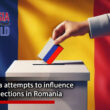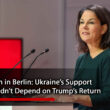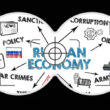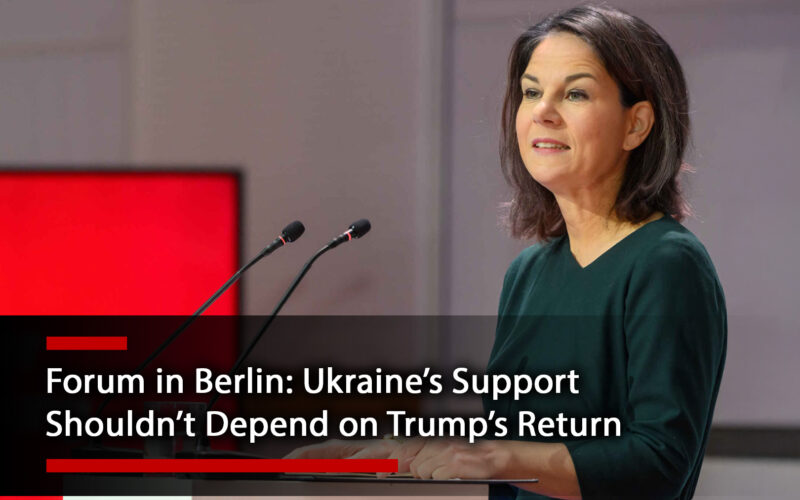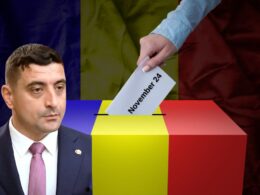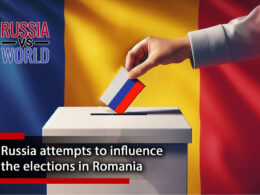At the annual Berlin Forum on Foreign Policy, Donald Trump’s assertion that he could swiftly end the war in Ukraine sparked discussion on how his approach might actually involve increasing military support for Kyiv, rather than withdrawing it. Participants at the international conference, organized by the Körber Foundation, looked into these possibilities.
Germany’s Foreign Minister: German Support for Kyiv Will Remain Unchanged by U.S. Election Results
Opening the forum, Germany’s Foreign Minister Annalena Baerbock emphasized Germany’s unwavering support for Ukraine, regardless of U.S. election results. Baerbock, a member of the Green Party, spoke of the resilience needed to face consecutive global crises, from the ongoing war in Ukraine to Germany’s political upheaval. Reflecting on her recent visit to a Ukrainian village that endured Russian occupation, Baerbock asserted that Germany’s commitment to aiding Ukraine remains steadfast and will not be dictated by U.S. politics, a stance largely supported across Germany.
Majority of Germans Support Increased Defense Spending
According to the Berlin Pulse survey conducted by the Körber Foundation, 57% of Germans favor continued military assistance for Ukraine. Additionally, 82% of respondents (+ 6%) perceive Russia as a military threat, with many supporting Defense Minister Boris Pistorius’s proposal to raise defense spending to 3-3.5% of GDP (instead of the 2% specified for NATO members). This sentiment shows the degree to which national security has become a priority, with some Germans calling for even higher defense budgets.
Liberal Democrat Leader: Ukraine Needs TAURUS Missiles, Not Just Funding
Despite Russia’s attempts to suggest weakening support for Ukraine, Baerbock reaffirmed the strength of Germany’s stance. Bijan Djir-Sarai, general secretary of the liberal FDP, rejected claims that his party opposed additional funding for Ukraine in Germany’s 2025 budget. Djir-Sarai explained that the FDP suggested reallocating funds within the budget rather than taking on additional debt, a point of contention with the coalition. Instead, he highlighted Ukraine’s urgent need for long-range TAURUS missiles, which Chancellor Scholz has thus far refused to provide.
More weapons, less restrictions
“Ukraine can’t wait for Russian missiles to reach its border. The only effective strategy to defend large cities like Kharkiv is to prevent these missiles and drones from being launched at all“
German Foreign Minister Annalena Baerbock
Baerbock also hinted at Germany’s support for sending Ukraine long-range weapons capable of reaching Russian military targets. Sharing insights from her recent trip to Kharkiv, located just 30 kilometers from the Russian border, Baerbock described how Russia’s close-range missile attacks often render air raid warnings ineffective. She argued that defending cities like Kharkiv requires the capability to preemptively prevent such attacks. “That means Ukraine can’t wait for Russian missiles to reach its border,” Baerbock said. “The only effective strategy to defend large cities like Kharkiv is to prevent these missiles and drones from being launched at all.’
On How Trump Could Stop the War in Ukraine
Nils Schmid, a foreign policy expert from Germany’s SPD faction in the Bundestag, declined to predict Trump’s potential Ukraine strategy, acknowledging that he could either pursue a deal with Putin at Ukraine’s expense or increase the U.S. military presence in Europe. Schmid also raised the possibility that Trump might embargo Western arms to Ukraine.
Attempting to ease German concerns, Liana Fix from the Council on Foreign Relations noted, “Putin wants to win this war, but Trump wants to end it,” emphasizing Trump’s aversion to seeing Ukraine defeated. Fix suggested that Trump could use the prospect of increased U.S. support for Ukraine to pressure Moscow into peace talks, noting that a visible Russian advance on Kyiv would be politically untenable for Trump among Republicans.
Kenneth Weinstein, former U.S. ambassador to Japan and former head of the conservative Hudson Institute, proposed that the U.S. could push for a demilitarized zone between Russia and Ukraine, akin to the buffer zone in Korea, with U.S. air support. Weinstein added that during Trump’s previous term, Putin refrained from invading Ukraine, implying Trump’s assertive policies might deter further Russian aggression.

